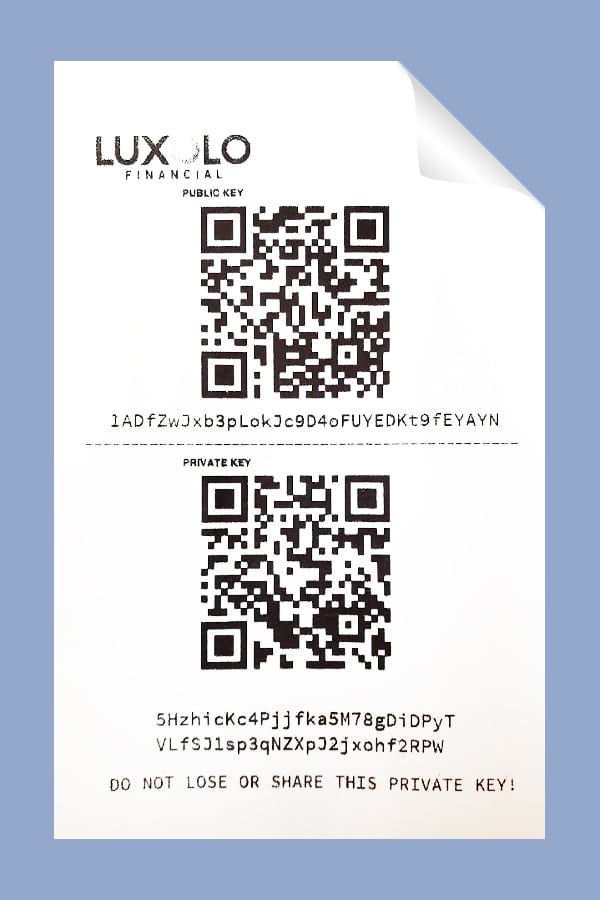Cryptocurrency Wallets are simple programs, software, or systems that enable the storage of public and private keys. Technically, the private key is the password you use to send your crypto. Public keys are your address. A wallet holds both of these keys in a secure manner.
Similar to how a wallet holds cash and credit cards, a crypto wallet holds your cryptocurrency coins and tokens.
Watch our video for a better understanding:
Understanding Private vs Public Keys
A cryptocurrency wallet consists of two keys: Public and Private.
There is a public key that you can share with your friends so they can pay you, but there is also a private key. You do not want anyone else to have the private key.
Think about it like this, your public key is actually also your address, like a paypal email. Anyone with the public address can send you money just like they would if they had your paypal email.
However, your private key is the password to your email. If you share this with someone, they can have complete and total access to your money.
With your public key, you can only receive transactions, and with your private key you can send them.
Public Key: 1ASUosE3iD1rfef6Pccw3UVF81t7F9fh7C
Private Key: L3PT6Qua1xMKg3tpzewX9sY6wBwPXC4LyEUcBan6iVugUnB5391w
One thing you do need to know is that different cryptos have different address structures. So a bitcoin address will look different than an Ethereum address, which looks different than a Cardano address.
Of course, there is no money in this address, but the keys are just a seemingly random mix of letters and numbers.
How a public and private key work is a little complicated, and if you’re interested you can read our Public vs Private Keys Article.
Anyways, all you need to know is a wallet is simply just a public key and a private key. Let’s move on to how to store these keys in 3 different wallet styles.
The 3 Types of Cryptocurrency Wallets
There are 3 types of cryptocurrency wallets:
1. Software Wallets
Software wallets are wallets that utilize software to store your keys. Many of these wallets are online based. Exchanges like Coinbase or Binance are great examples of a software or online based wallet.

However, Coinbase and Binance are examples of non-custodial wallets because they create your private keys for you, then share them. If you’d rather have 100% access to your keys, you can download software that another company won’t have access to, like Metamask.
When it comes to software wallets that you share with big companies like Coinbse, the public and private keys are stored on their servers, and they let you access them through your account. It’s important to know that they could technically spend your crypto… because the private key, or password, is on their servers.
2. Hardware Wallets

If you don’t trust your information with a company (or being on a server), you can opt into using a hardware wallet. These wallets are basically USB sticks that store your public and private keys. Nobody else has access to your keys, and you are the one who creates them.
These wallets usually have a secure process of getting into them, for example ledger live uses 24 key phrases to enter its system and there is no recovery process if you forget them.
If you forget those 24 phrases, your crypto is gone forever.
This is a double sided sword though, nobody is going to be hacking your crypto unless they get access to the ledger and know the password to get into it. One thing to note here, is that these physical devices can start to get quite pricey. I bought mine for $90ish dollars a few months ago.
3. Paper Wallets
The last wallet you can use for crypto is a paper wallet. This wallet would consist of your keys and maybe QR codes that are used to facilitate cryptocurrency transactions. Your public and private keys are literally written down on paper.
These are considered the most secure, but not necessarily the safest due to how easily they could be lost or destroyed.

Think of this like using cash to debit cards, though one of the largest problems with this method is the ability to lose or destroy the piece of paper if on purpose of by accident. This is the most secure, but the least practical, which means you should really only use this if you have a large sum of money you want to protect without accessing it often.
Are Crypto Wallets Secure?
Another thing you need to know about wallets is we classify them into 2 categories: hot and cold.
A Hot Wallet is one that is connected to the internet and can be accessed online or on through an application.
A Cold Wallet is one that has to either be connected to a computer like the USB method or having it written down on paper.
Now that we know these, we can discuss if they are secure.
If you’re using a hot wallet it’ll always be vulnerable to online attacks and hackers are always trying to find the new best way to access a system. Once your private key is public, you can kiss your bitcoin goodbye.
If you’re using a cold wallet the biggest vulnerability is either losing it or forgetting the pass phrases. It really depends on the applications. If you’re mining crypto and want to immediately send it somewhere, a hot wallet like Coinbase is fine, but if you’re investing hundreds of thousands of dollars, you may want to invest in a Ledger Live.

